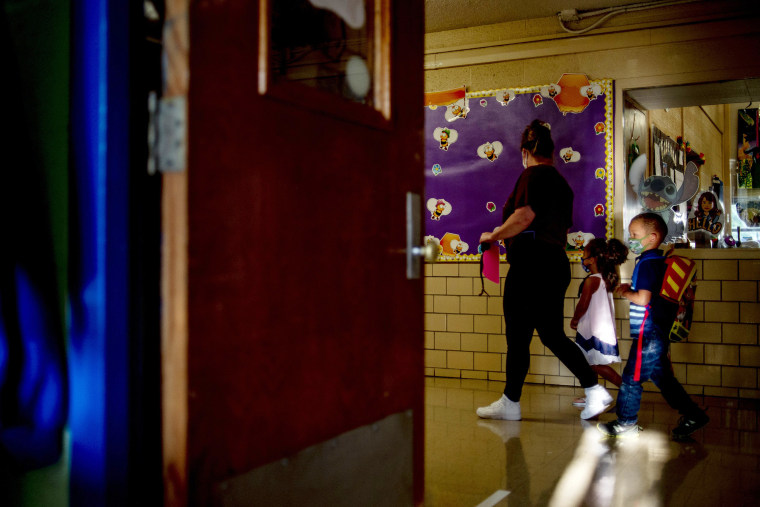The Food and Drug Administration must work "aggressively" toward authorizing a Covid-19 vaccine for children under age 12, the head of the American Academy of Pediatrics wrote in a letter to Dr. Janet Woodcock, acting commissioner of the FDA.
The urgent plea comes as the U.S. experienced the "largest week-over-week percentage increase in pediatric Covid cases since the start of the pandemic," Dr. Lee Savio Beers, the academy's president, wrote in the letter Thursday.
Pediatric cases of Covid-19 have soared in recent weeks in part because of the highly contagious delta variant, raising worries among parents and doctors just as schools are reopening for the fall semester.

Full coverage of the Covid-19 pandemic
"The delta variant has created a new and pressing risk to children and adolescents across this country," Beers wrote in the letter to the FDA.
According to the latest data available from the pediatric academy, 38,654 pediatric Covid cases were reported during the week of July 22. Within a week, on July 29, that number jumped 85 percent, to 71,726.
Already, parents of younger children are increasingly asking their kids' pediatricians for Covid-19 vaccines, said pediatrician Dr. Richard Besser, former acting director of the Centers for Disease Control and Prevention.
"I've had parents with kids as young as age 9 asking for the vaccine," said Besser, who is now president of the Robert Wood Johnson Foundation. "We've had to say no."
Only the Pfizer-BioNTech Covid vaccine has been authorized for adolescents and teens, ages 12-17.
While the Covid vaccines in use in the U.S. have been shown overall to be safe and highly effective in preventing severe illness among teenagers and adults, vaccinating younger children requires extra scrutiny and study.
That is, children are not simply little adults. In general, kids need a smaller dosage of immune-boosting products, such as the Covid-19 vaccine, than adults.
Children "need a unique dose, and maybe even unique timing" in spacing out those shots, said Dr. Natasha Burgert, a national spokesperson for the American Academy of Pediatrics and a practicing physician in Overland Park, Kansas.
"Maybe they need two doses. Maybe they need one, maybe three. I don't know. We haven't seen any of that data," Burgert said.
The three companies with Covid-19 vaccines in use in the U.S. — Johnson & Johnson, Moderna and Pfizer-BioNTech — are all attempting to answer these questions through research in pediatric trials.
Pfizer expects data on kids ages 5 through 11 in September, with data on toddlers up to age 4 soon after. Moderna's timeline for data on children is likely later this fall or early winter.
The FDA has requested four to six months of follow-up safety data from the children's clinical trials — compared to two months follow-up data required for the adult vaccine trials. In her letter, Beers wrote that the spread of delta has made authorization of the vaccine for ages 5-11 more urgent and that waiting for a six-month follow-up would be a risky delay.
"Based on scientific data currently available on COVID-19 vaccines, as well as on 70 years of vaccinology knowledge in the pediatric population, the Academy believes that clinical trials in these children can be safely conducted with a 2-month safety follow-up for participants," Beers wrote.
That's because adverse events related to vaccines are not expected to pop up after a month or two following the shot, experts say. Still, doctors say they need time to tease out other side effects, mainly to assure parents.
"A sore arm in a 40 year old is very different than a sore leg in an 11 month old who's beginning to walk," Dr. Buddy Creech, a principal investigator for Moderna's KidCOVE study, said. "We have to understand what those side effects look like, and which are normal, so that we can tell parents what to expect."
An FDA official previously suggested to NBC News that the first Covid-19 vaccine for kids under age 12 could come as soon as "midwinter."
That jibes with the timeline Creech anticipates.
"I would imagine that late fall and early winter, we're going to have sufficient data to be able to make recommendations regarding these vaccines" for children 11 and younger, he said.
Download the NBC News app for full coverage of the Covid-19 pandemic
The research requires a delicate balance of risks, according to Creech. If children get too much vaccine, they may have increased side effects.
On the other hand, "giving too little may lead to a false sense of security without actual protection," he said. "We've really got to do that hard work of finding the right dose. We are getting there. But that takes time."
The FDA did not respond directly to the letter from the American Academy of Pediatrics, referring instead to previous statements from Dr. Peter Marks, director of the FDA Center for Biologics Evaluation and Research.
Pediatric vaccine studies "take a little longer to do because we are requiring longer follow-up to make sure that the safety is adequate," Marks said during a call with stakeholders in late June.
The FDA has asked vaccine manufacturers to increase the number of pediatric study participants in an attempt to tease out rare adverse effects, such as myocarditis, an inflammation of the heart, in some young people who received the Johnson & Johnson vaccine.
Physicians on the front lines of the increase in pediatric Covid-19 cases continue to insist: The vaccine is the best and safest way out of the pandemic, even for young people.
"I wish we didn't have to be in this place," said Dr. Sean O'Leary, vice chair of the Committee on Infectious Diseases for the American Academy of Pediatrics. "This was avoidable."
Follow NBC HEALTH on Twitter & Facebook.

